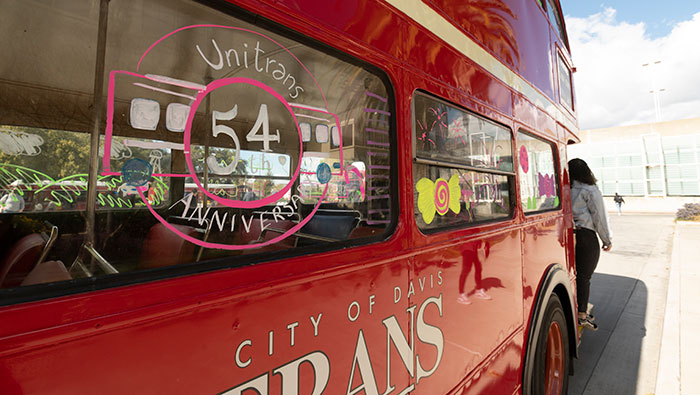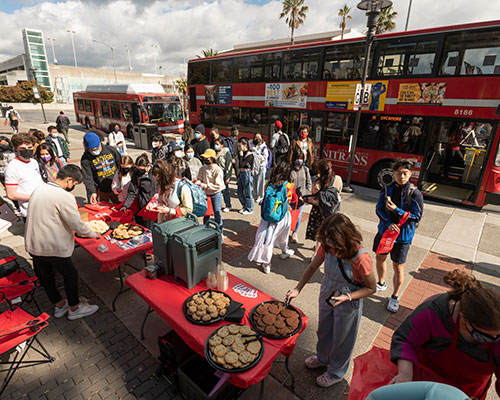
After being sidelined for nearly two years because of the coronavirus pandemic, Unitrans’ vintage double-deckers from London — iconic symbols of UC Davis — are going back to work.
In celebration of the campus-city transit system’s 54th birthday on March 4, offerings included free rides throughout the system all day (including a lunchtime shuttle service to downtown), refreshments and swag and a parade of double-deckers old and new.
The beginning
Credit the Associated Students of the University of California, Davis, for, first, taking the initiative to start a bus system, and then making the unusual choice to start its fleet with the quaint, red double-deckers from London. The student government bought two of the used buses, putting them into service on Feb. 28, 1968, on two routes on and around the campus.
The buses, RTL 1014 and RTL 1194, would be the first of several London double-deckers that Unitrans acquired over the years. Some of them came to the end of the line, others gave up parts to other buses, and RTL 1014 went back to London, sold to a company that provides buses for hire (the same company that sold the bus to the ASUCD in 1967).

Today, Unitrans has a fleet of 45 modern buses, including four double-deckers, serving 19 routes.
The transit system is holding on to four London buses, three of them operational and ready for Friday’s lunchtime shuttle. Unitrans is anxious to get them back on the street, anxious for people to see how good they look. “We’ve used the past two years to rehabilitate, repaint and reupholster all of them,” said Jeff Flynn, Unitrans general manager.
He acknowledged the Unitrans shop, including student employees, for taking care of the engine and body work (including the wooden parts of the bus frames). Outside shops handled the paint and upholstery jobs.
Driver shortage
Unitrans, which established a partnership with the city of Davis in 1972, remains an ASUCD operation, largely run by students.
But, right now, Flynn needs more students hiring on as drivers. He’s been dealing with a persistent shortage amid the pandemic and remote instruction, which interrupted a traditional way of filling Unitrans jobs — by word of mouth, when veteran drivers talk up the bus system to incoming students as a great place to work. Indeed, Unitrans jobs are often rated as among the best on campus.
The transit system normally operates with 175 drivers but is about 50 shy of that number and will lose 55 drivers to graduation in June, Flynn said.
“Drivers, drivers, drivers, that’s what we need,” he said, encouraging interested students to look for the job posting on the ASUCD website or come to the birthday celebration at the MU Terminal to speak with students who are driving now for Unitrans.
With more drivers, Unitrans can restore service cuts and take back two routes (A and L) that Yolobus is operating temporarily.
Electric future
Over the last two years, Unitrans ridership has fallen to just under 2 million passengers a year, about half the prepandemic level.
“Stability” is what Flynn is hoping for in Unitrans 55th year, with a return to normal service levels.
He’s also looking forward to carrying passengers on Unitrans’ first electric buses. The first six are due to arrive in April, and their charging stations are set to go at the bus yard. Flynn said the buses should go into service this summer.
Eight more charging stations will be installed in April for more buses headed our way — four in 2023 and four in 2024.